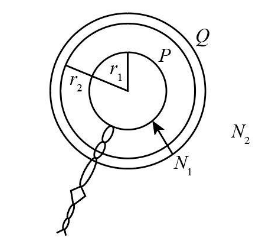Question
Question: Two plane circular coils P and Q have radii \({r_1}\) and \({r_2}\)respectively\[({r_1} << {r_2})\;\...
Two plane circular coils P and Q have radii r1 and r2respectively(r1<<r2)and are coaxial as shown in fig. The number of turns in P and Q are respectively N1and N2. If the current in coil Q is varied steadily at a rate x ampere/sec, then the induced EMF in the coil P will be approximately?

(A) μ0N1N2πr12
(B) μ0N1N2πr12
(C) 2r2μ0N2×N1×πr12×x
(D) 0
Solution
Biot-Savart law provides the value of the magnetic field in a circular loop due to the current in the loop. The value of the magnetic field at the centre of a circular loop can be calculate by the formula B=2rμ0NI , here I represents current in the loop, r is the radius of the circular loop, N is the number of turns and μ0 is the permeability of the vacuum. And The EMF induced can be calculated by Faraday's law.
Complete step by step answer:
Let the current I2 is flowing in the coil Q
It is given that the current in coil Q is varied steadily at a rate x ampere/sec.
So
dtdI2=xampere/amperesecsec...........(1)
It is given that (r1<<r2) so the coil P will act as a centre for coil Q.
The magnetic field at coil Q is given as follows,
BQ=2r2μ0N2I2
This magnetic field will provide magnetic flux in the coil P.
So the magnetic flux in the coil P is
ϕ=N1BQA
Here, A is the area of coil P and that is A=πr12
The value of the EMF induced in coil P will be equal to the rate of change in the magnetic flux in the coil P.
So the EMF in the coil P by using of Faraday's law is,
ε=dtdϕ ⇒ε=dtd(N1BQA) ⇒ε=N1Adtd(BQ)
Substitute all the values in the above expression.
ε=N1Adtd(2r2μ0N2I2) ⇒ε=2r2μ0N2×N1A×dtdI2
Substitute the value of A and the value of dtdI2 from equation (1).
∴ε=2r2μ0N2×N1×πr12×x
Therefore, the induced EMF in the coil P is 2r2μ0N2×N1×πr12×x and correct option is option (C).
Note: In such types of questions first find the magnetic field in the first coil then evaluate induced magnetic flux in the second coil and then you can calculate the change in magnetic flux or induced EMF in the second coil.
